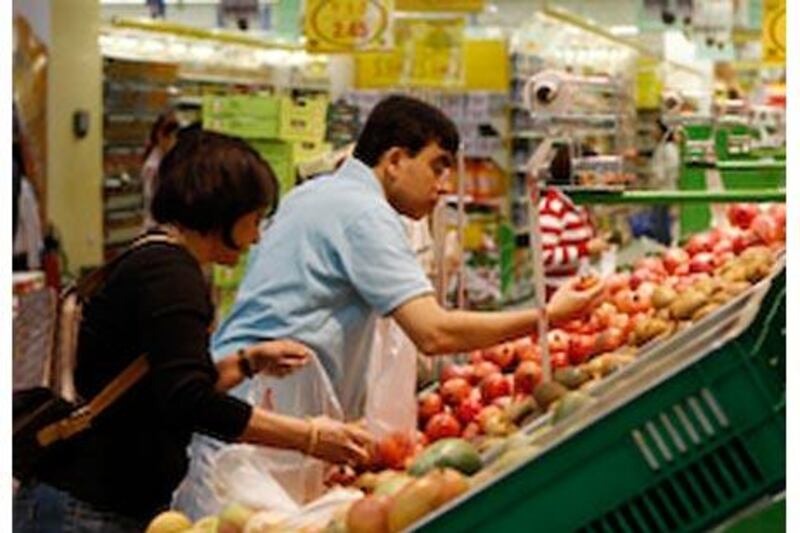ABU DHABI // Shoppers can save up to 30 per cent on selected grocery items this month under a government-backed programme to mark Gulf Consumer Protection Day, which was held yesterday. Discounts on about 1,000 items across the country, including chicken and rice, are the latest moves by the Consumer Protection Department of the Ministry of Economy to battle the high cost of food. Some of the country's biggest supermarket chains, including LuLu Hypermarkets and most co-operative societies, are taking part in the programme, which follows the imposition of price caps and reductions on key foods. Consumers were given further relief as prices fell with the global economic crisis.
LuLu Hypermarket will cut the price of Brazilian chicken from Dh9.50 a kg to Dh8.50 a kg, while a tin of milk powder will be reduced from Dh50 to Dh44.20. Dr Hashim al Neaimi, director of the Consumer Protection Department, said: "I tried to co-ordinate with all sectors, the private sectors and also the co-ops, to try to help the consumer. "These are strategic items, such as rice, flour, sugar and oil." The Abu Dhabi Co-operative Society planned to discount 235 items and LuLu Hypermarkets would sell about 50 items at the suppliers' price, he said.
Sharjah Co-operative Society is discounting 200 items, Baniyas Co-operative Society has 150 items, and the Union Co-operative Society is selling 25 items at cost. Other reduced items include lamb, orange juice, corn flakes, cheese, dishwashing liquid, toothbrushes and facial tissues, said V Nandakumar, the corporate communications manager at Emke Group, which runs LuLu Hypermarkets. Discounts on the items ranged between 10 per cent and 30 per cent, Mr Nandakumar said. "We are going to make less money than we were making before, but it is something that we felt strongly about."
Discounts would be similar at other retailers, he said, as most supermarkets had a profit margin of between 10 per cent and 20 per cent for fast-moving consumer goods. The consumer protection department has been working with retailers to freeze or reduce the prices of key foodstuffs after inflation hit a record high of 12.2 per cent in March last year. But as the prices of commodities such as rice edged higher, pushed up by high oil prices, retailers struggled to honour the voluntary price caps. By December, inflation in the UAE had peaked, analysts said. Andy Barnett, a professor of economics at the American University of Sharjah, said inflation in the UAE has dropped significantly."I would guess [inflation] is approaching zero," he said. "It may not be down there yet but it's approaching there."
And as oil prices dipped, commodities on world markets fell about 30 per cent since June last year, according to the Food and Agriculture Organisation's food price index. The reductions are a welcome relief for residents in the UAE, which imports about 80 per cent of its food. Mr Nandakumar said Lulu might add more items to the list, and possibly continue with the profit-free pricing programme after March 31. He also said he hoped it would spur suppliers to bring down prices. "If this is reciprocated by the manufacturers and the importers, then definitely the product price will come down," Mr Nandakumar said. "This might act like a catalyst." But Mr Barnett said the programme was likely to only provide only a short-term reprieve. "After this period, the prices will return to whatever they would have been otherwise," he said. "It doesn't have any long-term impact." aligaya@thenational.ae





